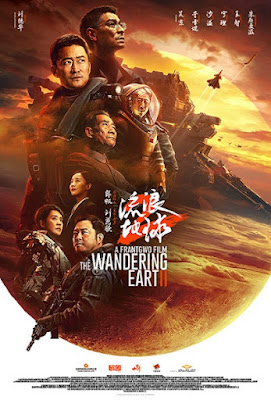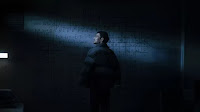In the hit 2019 film and Liu Cixin’s original source novella, the Earth made like the Moon did in Space: 1999, spinning out of its orbit and into space. However, in the case of the Wandering Earth, this was done deliberately, to save humanity from its dying sun. It took a lot of work to make it happen. In the first movie, Earth escapes the sun, but the prequel shows how we handled the Moon first. Prepare for a whole lot of talk about the Roche Limit in Frant Gwo’s The Wandering Earth II, which just opened today in theaters worldwide.
Chinese
astronaut Liu Peiqiang will save (or has saved) the Earthly civilization in The
Wandering Earth I. It turns out, he will now do it again, or rather has
done it before. The film starts with a well-orchestrated terrorist attack
against the space-elevator servicing what was then called “The Moving Mountain
Project.” It is a brilliantly realized, extended action sequence, but it is
also impossible to miss the Anglo-American appearance of most of the terrorists.
Indeed, it
is blatantly obvious much of WEII is intended as an allegory celebrating
China’s hardcore “Covid-Zero” approach to crisis management and excoriating the
Western preoccupation with individuality. Of course, it never shows Chinese
scientists destroying evidence of the looming solar crisis, as was the case
with the initial Covid outbreak in Wuhan.
Be that as
it actually was, there are pieces of two really good movies in WEII. The
aforementioned space-elevator scene is a whizzbang set piece. The film also
evolves into an intriguing speculative sf drama exploring the nature of
artificial intelligence and sentient consciousness. Andy Lau plays Tu Hengyu, a
computer scientist still mourning the death of his young daughter, whose
consciousness he has digitally copied, in contradiction of current laws.
Hengyu’s
efforts are risky, because he is trying to accomplish what the “Digital Life”
movement, the major opponents of “Moving Mountain” project advocate. To do so,
he needs the processing power of the HAL9000-like 550W super-computer running the
project. This story arc takes several provocative twists and turns. Lau is also
terrific as Tu, bringing a desperately needed human dimension (somewhat ironically)
to a film that often desperately needs it. (However, it is sad to see the
Chinese flag on Mr. Hong Kong’s shoulder, rather than HK’s five petals.)
The problem
is these two parts are held together by long stretches of exposition and CCP-China
propaganda, often relayed through UN-style speeches and news reports. This
style of filmmaking is both boring and insultingly didactic. Frankly, the
character of Zhou Jiechi, the wise Chinese ambassador to the UEG (the UN
successor organization) is an insult to all the victims of Covid and the
ongoing genocide in Xinjiang.
Wu Jing does a bit of parental brooding over his son (who becomes a bit of a pill in the first (sequentially second) film, but mostly he falls back on his Wolf Warrior action persona. There are representatives of nearly every nation (including a short-lived Brazilian astronaut), to convey the planetary scope of the project. Yet, most of the sympathetic characters who are not Chinese, happen to be Russian. (One wonders if Gwo and the producers might like to change that, now that the CCP has backed away from its support of Putin’s invasion of Ukraine.)
There was some helpful Chinese collaboration saving the world in Roland Emmerich’s Moonfall, but that movie was nowhere near as propagandistic. It also featured more fully fleshed out characters, which makes it a more fully realized film. Wandering Earth II has its impressive pieces, but as a cohesive film, it is considerably flawed and far too long, at just a hair under three hours. Not wholly recommended, Wandering Earth II is now playing in New York, at the AMC Empire.

